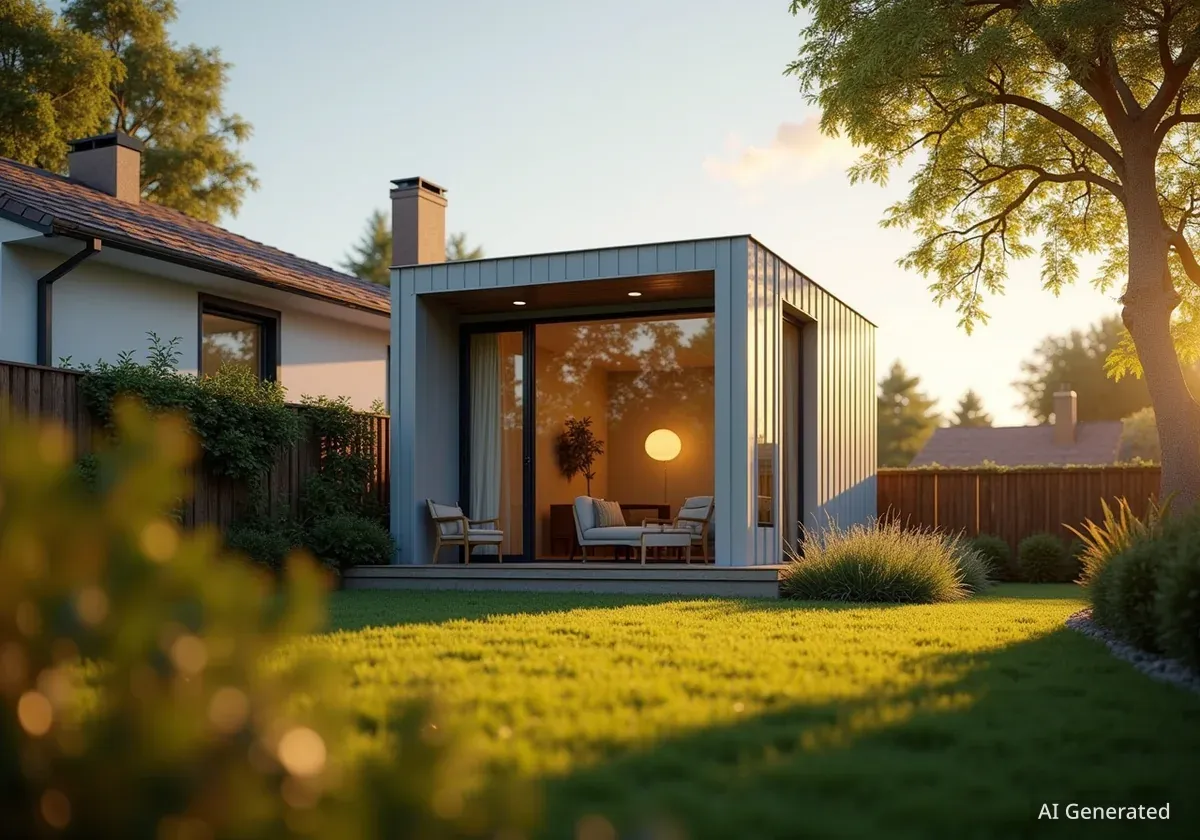Accessory Dwelling Units (ADUs), known as granny flats or guest houses, are becoming a popular housing option across the United States. These self-contained living spaces, built on the same property as a main residence, offer solutions for passive income generation, multi-generational living, and increased property value. Interest in ADUs has significantly grown, with some builders reporting a 30% increase in inquiries over the past year.
Key Takeaways
- ADUs are separate living quarters on the same property.
- They offer solutions for passive income, multi-generational living, and property value increase.
- Demand for ADUs has risen sharply, with some builders seeing a 30% increase in inquiries.
- The construction process involves discovery, site assessment, and a detailed proposal.
- New legislation in Colorado, HB 24-1152, will ease restrictions and provide incentives for ADU construction.
- Financing options include Home Equity Loans, HELOCs, and Cash-Out Refinance loans.
Understanding Accessory Dwelling Units
An Accessory Dwelling Unit (ADU) is a secondary housing unit on a single-family residential lot. These units can be attached to the primary home or garage, or they can stand alone. Common names for ADUs include mother-in-law houses, granny flats, or guest houses. The concept provides flexible living arrangements for homeowners.
In recent years, the interest in ADUs has increased for several reasons. Many homeowners seek to generate additional income from their property. They can rent out an ADU, creating a steady stream of passive income. Other families use ADUs to live closer to relatives while still maintaining individual privacy.
ADU Growth
According to Caleb Blair with God's Country Development, inquiries for ADU construction have risen by approximately 30% in the last year alone. This highlights a significant shift in housing preferences and needs.
The ADU Construction Process
Building an ADU involves several steps. It is important to work with a contractor who specializes in this type of construction. Experienced builders understand the unique challenges and requirements of ADU projects.
God's Country Development, a company specializing in ADUs, follows a three-step process for clients:
- The Discovery Call: This initial step involves asking detailed questions to understand the client's specific needs and goals for the ADU.
- The Site Visit: Experts assess the property to determine feasibility, zoning requirements, and potential construction possibilities.
- The Proposal: A comprehensive plan is presented to the client, outlining design, costs, and timelines.
This process ensures that every aspect, from initial planning and blueprints to permits, utilities, and final construction, is managed efficiently. Builders work closely with clients to meet their exact specifications.
Client Profiles for ADU Construction
Clients interested in ADUs generally fall into two main groups:
- Investors: These clients aim to maximize their property's financial potential. They see an ADU as a way to generate passive rental income or increase overall property value for future sale.
- Lifestyle Clients: These homeowners want to add value and space for family members. This often includes providing independent living quarters for elderly parents or adult children.
Meeting Diverse Needs
ADUs offer a versatile housing solution. They address various needs, from financial investment to supporting multi-generational families. This adaptability makes them attractive in today's evolving housing market.
Addressing Senior Housing Needs
One of the most compelling reasons for ADU construction is to provide housing for elderly family members. Seniors often wish to live near their children while maintaining independence. ADUs offer a way to achieve this balance.
When an ADU is built for seniors, it is crucial for builders to involve both the homeowner and the future residents in the design process. This ensures the elderly parents feel heard and have a comfortable home that respects their independence.
"It is often a difficult decision for parents to move in with children, so it is paramount that they feel heard and are a critical part of the design process. Finding a contractor with experience in dealing with this specific type of client is essential," states Kristie Gerber, a Senior Real Estate Specialist with The Mesa Group at Keller Williams Colorado West Realty.
Experienced contractors understand the specific needs of senior residents. This includes considering accessibility features, ease of movement, and overall comfort. The goal is to create a home that fosters pride and independence.
Financing Your ADU
Financing an ADU is a common concern for homeowners. Many lenders specialize in ADU financing. Homeowners with existing property equity have several options:
- Home Equity Loan: This provides a lump sum of money using your home equity as collateral.
- Home Equity Line of Credit (HELOC): A HELOC offers a revolving line of credit that you can draw from as needed.
- Cash-Out Refinance: This involves refinancing your existing mortgage for more than you owe and taking the difference in cash.
Consulting with an expert Realtor can help homeowners find a reputable lender. It is also wise to speak with a financial planner. They can help determine the best financial strategy for long-term goals.
Financial Advice
Always consult a financial planner to assess the impact of ADU financing on your overall financial future. This ensures a sound investment decision.
New Opportunities in Colorado
Building an ADU can significantly increase property value and generate additional income. However, local rules and regulations vary by city and county. Homeowners must research these requirements.
A strong team is essential for navigating the ADU process. This team should include:
- A qualified Realtor
- A reputable lender
- An experienced contractor or builder
- A financial planner
- A Certified Public Accountant (CPA)
This team provides comprehensive guidance from start to finish. Doing thorough research and selecting the right professionals is critical for success.
Impact of New Legislation
Colorado's House Bill 24-1152, effective June 30, 2025, is set to create new opportunities for ADU development. This legislation aims to ease building restrictions and modify Homeowners Association (HOA) rules to permit ADUs more broadly. It also introduces new financial incentives for homeowners.
This law will significantly increase options for property owners across Colorado. It is expected to add value to properties statewide by making ADUs more accessible. Homeowners should consult with a local Senior Real Estate Specialist to understand the specific opportunities available in their area.
The evolving landscape of ADU construction offers flexible and valuable solutions for housing. From financial investment to multi-generational living, these units are becoming an important part of the real estate market.





